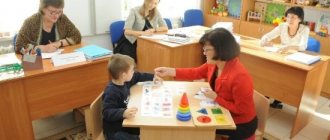Hearing problems in children can go unnoticed by adults for a long time. Especially if the baby was given all the necessary tests in the maternity hospital and no pathologies were found, the growing child can basically hear. We'll tell you what signs of possible hearing loss should alert parents, and how important it is to contact a specialist in a timely manner.
Now let's look at the ears
When to see a doctor
By the age of 4, children know up to 2000 words, speak clearly, pronouncing words clearly. In speech they use extended phrases of several words. They know how to inflect words and use them correctly in a sentence. They show interest in new words and understand the plot of a fairy tale or short story. Difficulties can be caused by complex words, hissing and sonorant sounds. But these are physiological norms that do not require specialist intervention.
Delayed speech development in children 4 years old can be suspected when they have deviations: in the rate of speech, pronunciation of sounds. Because of problems, the baby prefers to remain silent or speaks fragmentarily.
IRR at 4 years of age increases the likelihood of neurological and even mental abnormalities. An inferiority complex gradually develops, the baby is embarrassed or afraid to communicate with peers, and behaves separately. In the future, this will affect the learning process, academic performance and mastery of the school curriculum. Children whose parents ignore the child’s problem and do not engage in his development are especially in a difficult situation.
Therefore, at the first signs of a speech disorder, you should consult a doctor and begin treatment.
Which specialists should you contact?
If a child practically does not speak at 3 years old or does it poorly, you should undergo a comprehensive medical examination by the following specialists:
- pediatrician (detects the presence of disorders and refers for examination to other specialists);
- otorhinolaryngologist or audiologist (check the child’s hearing);
- speech therapist and defectologist (using testing, they determine the level of speech development and identify deviations in its formation);
- neuropathologist (studies the baby for the presence of pathologies of the nervous system);
- psychologist (identifies disturbances in the child’s emotional state);
- psychoneurologist (may be required to accurately determine the diagnosis).
If the child’s psychological and physiological state is normal, a speech therapist and parents will help him cope with difficulties in speech development. To do this, you need not only to consult a competent doctor, but also to constantly work with your baby at home.
Peculiarities of manifestation of delayed speech development in children 4 years old
Features of delayed speech development in children 4 years old are slow or fast speech, blurred sounds, omissions of letters or syllables. Some children do not pronounce words at all or abbreviate them, replacing words with syllables, gestures, and facial expressions.
Characteristic symptoms:
- difficulties in formulating the question and in answering the question addressed to him; the answers are usually monosyllabic (“yes”, “no”, “there”, “here”);
- poor vocabulary - usually uses only those words that are used in everyday life;
- incorrect pronunciation of complex words;
- skipping syllables and sounds;
- lack of skills in composing a simple story or sentence based on a picture;
- replacing words that sound similar;
- There are no hissing or whistling sounds in the articulation, or the patient pronounces them incorrectly;
- replacing sounds with easier ones to pronounce;
- lack of criticism of speech errors in oneself and other people.
What should I do to help my child?
A competent speech therapist will definitely give advice and exercises that parents can do to help their child develop speech. As a rule, parents are recommended:
- Actively communicate with your child. You need to talk to your baby from birth. Only constant communication can arouse interest in speech in a baby. Adults should speak clearly and distinctly, sing songs, and tell stories. Every action must be accompanied by words. As a result, a constant language environment will push the child to learn conversational skills more quickly and easily.
- Pay attention to the quality of speech. It is extremely important that the speech of adults is clear and literate. The use of filler words should be avoided. You cannot distort words or lisp when communicating with your baby. The child’s perception and the clarity of his pronunciation depend on this.
- Use educational toys. You should not use gadgets and games built into them. You can take cubes, pyramids, puzzles or mosaics. You should actively participate in the gameplay, describing what is happening in words. This will help shape not only speech, but also thinking, logic and memory.
- Develop fine motor skills. Experts believe that the formation of fine motor skills directly affects the development of speech skills. You should constantly work with your child on modeling from plasticine, stringing beads, sorting out small toys, etc.
- Visualize. Bright pictures with fairy-tale characters, animals, fruits and other objects motivate kids to describe them. Parents should show the child images and tell them what is drawn on them.
If necessary, in addition to classes, a speech therapist can also prescribe medications to stimulate the brain's speech zones, procedures, speech therapy massage, or alternative correction methods (hippotherapy, swimming with dolphins). It should be remembered that there are no universal approaches, because each child is individual, and only a specialist can take into account all his features during the development of the speech apparatus.
Publication date: 06/24/2019. Last modified: 01/13/2020.
Causes of delayed speech development in children 4 years old
Various reasons lead to 4-year-old developmental disorder. Some of them affect the fetus in the womb, some - during childbirth and after birth.
Antenatal reasons:
- complications of pregnancy, threat of miscarriage, toxicosis, gestosis;
- illnesses of the expectant mother - exacerbation of chronic diseases, infectious and inflammatory, injuries, intoxication, bad habits;
- conditions that led to fetal hypoxia - placental pathology (anomalies, abruption), umbilical cord entanglement.
During childbirth:
- premature birth;
- rapid labor;
- injuries during childbirth;
- inadequate management of labor, use of obstetric forceps.
After childbirth, delayed speech development in children 4 years of age can result from:
- injuries, especially traumatic brain injuries, are dangerous for speech development;
- diseases - neurological, for example, cerebral palsy, encephalopathy;
- unfavorable family situation - conflicts, parents do not care for the child;
- the opposite situation is overprotection, excessive pressure and demanding parents;
- excessive stress - physical (sports), mental (overload with activities).
Predisposing factors are a hereditary predisposition to RRD at 4 years of age. These may be genetic disorders, congenital abnormalities of the nervous system,
Methods of treating RDD at 4 years of age
Correction of delayed speech development in children 4 years old takes place with the participation of a speech therapist, neurologist, psychologist, and ENT doctor. First, a diagnosis is carried out, during which specialists identify the cause of the defect, find out the features of the course of the antenatal, intranatal (childbirth period) and postpartum period. They study the outpatient card, previous diseases, the nature of physical and neuropsychic development up to one year and at an older age.
This is followed by the stage of hardware examination methods to clarify the diagnosis and exclude organic pathology of the ear, brain, and articulation organs. Electroencephalography, X-ray, MRI or CT scan of the brain, and audiometry are performed. After an accurate diagnosis has been made, treatment for mental retardation begins at 4 years of age: it should be comprehensive, using various methods.
Held:
- Drug treatment - nootropics, sedatives, vitamins, as well as herbal medicines;
- Speech therapy correction - speech therapy massage of the tongue, lips, facial muscles, articulation gymnastics, breathing exercises;
- Physiotherapeutic procedures, including magnetic therapy, acupuncture;
- General massage;
- Physiotherapy.
All treatment procedures are prescribed by a specialist. He knows the characteristics of your child’s 4-year-old RRD, the cause, and based on this he selects an individual treatment regimen. It is unacceptable to independently prescribe a drug, even if it is herbal, to change the dose of a medicine prescribed by a doctor or to cancel it.
An important component of successful treatment is eliminating the cause of the defect. Conflicts, quarrels, mental and physical stress should be avoided.
With the timely start of the correctional program, the absence of severe neurological and mental pathology, and the active participation of the child and parents in the treatment process, the prognosis is favorable. Children's pathological pronunciation of sounds disappears, they begin to speak correctly, clearly and expressively. They ask and answer questions competently. The vocabulary is gradually expanding.
A 4-year-old child diagnosed with RRD is being registered at a dispensary. Specialists monitor him and monitor his further development of speech skills. This is necessary to prevent relapse of the disease. If this happens, it is important to start therapy on time.
Why doesn't a baby speak at 3 years old?
21.02.2020
The main indicator of a child’s health is speech activity, starting from the age of 3. But what to do if the baby has not spoken by this period of time? There may be some health problems and you need to sound the alarm urgently.
By the age of three, a child, listening to the speech of parents and others, remembers words and slowly begins to speak. Speech is limited to simple everyday words. Before the age of five, it is very important to eliminate all problems in speech , since the nervous system .
At 3 years old, a child should be able to:
- knows his name, his age, the names of his mother and father;
- while playing, pronounces the name of the things that surround him;
- watches cartoons with attention and listens to poems and fairy tales;
- a child’s vocabulary at this age consists of approximately 1 thousand words;
- understands when he is addressed and what is required of him;
- pronounces sentences consisting of more than three words.
Each child develops individually, but there are indicators that are common to all, and if they deviate, you must consult a doctor for diagnosis. Only a specialized doctor can correctly diagnose and prescribe treatment.
Parents should pay attention to their child’s behavior if he does not try to talk to peers or loved ones. He doesn’t know how to express in words what he sees and what surrounds him.
There is cause for concern if:
- the child speaks slurredly, swallows words, is hard to hear and speech is unintelligible;
- limited to phrases consisting of a maximum of two or three words;
- doesn’t know his name or what his mom and dad’s names are. Can't answer how old he is;
- to speech and to requests to do something.
Another reason that a child cannot speak may be hearing . In this case, it is necessary to contact a pediatric otolaryngologist as soon as possible.
Speech problems in children are identified:
- speech delay;
- pathology of speech activity – sensorimotor alalia;
- speech formation disorder .
In identifying the symptoms of these disorders, it is necessary to contact a defectologist.
There are many reasons that cause speech defects in a child:
- disorders or pathologies during pregnancy ;
- genetic inheritance;
- various diseases, injuries of the child;
- lack of attention to the child's development.
Diseases of parents that are transmitted genetically can also cause late development of the child. Diseases associated with the brain , injuries and complications after illnesses. Also, the child’s low activity, spending time in front of the TV or tablet can negatively affect the child’s perception of reality. Which will also create a negative background in development.
The treatment program may vary. The doctor will make a diagnosis and prescribe diagnostic tests. It is also possible to prescribe drugs that activate brain activity. Various exercises and individual programs for children can significantly improve the condition of the body.
Parents should take an active part in the child's life. Walk in the fresh air, play active games, read more poems and fairy tales, listen to classical music, learn to pronounce everything that he sees. The development of fine motor skills , massage , gymnastics - all this will have a positive effect on the body as a whole.
What are the reasons for refusing treatment?
Many parents, finding themselves in such a situation, underestimate the seriousness of the problem, thinking that the child will grow up and speak on his own. They should be upset, since the consequences are often irreversible:
- poor command of figures of speech ;
- pronunciation of sounds : incorrect and unclear;
- limited vocabulary;
- poor imagination;
- inability to form complex sentences.
As a result, the child may withdraw into himself and not show interest in the world around him. The need to communicate with peers will disappear, as the child can completely withdraw into himself.
If the disease is diagnosed, there is a chance of complete recovery of the body by 6-7 years, if the child has received full treatment.
The baby needs to be given maximum attention from the moment he is born. Closely monitor developments and changes in his behavior. Chat, play, read books.
Published in Defectology Premium Clinic
The role of parents in the treatment of mental retardation at 4 years of age
Eliminating speech development delays in 4-year-old children is a matter for specialists with the appropriate education and skills. But parents also play a big role. First of all, the situation in the family has an impact on the child’s condition, including the development of speech. Conflicts and quarrels, even if the baby is not involved in them, affect the child’s psyche. This is fraught with a slowdown in the pace of development.
In addition, in some families no one takes care of the children. They are left to their own devices. If there are prerequisites, for example, close relatives have a speech pathology, then we can talk about a hereditary factor. Such a child will have speech delays.
The next point is the presence of a person with incorrect speech in your environment. The baby will imitate him and speak incorrectly. Experts recommend protecting your child as much as possible from people with pathological speech. That is why parents should always speak correctly, pronouncing all sounds clearly and slowly. You cannot lisp the baby or distort words - this rule must be followed by all family members.
Overprotection also contributes to delayed speech development in children 4 years old. Don't demand anything supernatural from your child. Each person develops at his own pace. By overloading your son or daughter with activities, without leaving a minute of free time, you only make things worse: this is constant stress for children. This can cause other defects to appear: stuttering, enuresis, sleep disturbances.
What to do if problems are found?
Contact an audiologist - a doctor who deals with hearing problems (you can first make an appointment with an ENT specialist) and prescribe treatment. There are no other options.
Identified pathologies do not automatically mean the development of deafness. Many can be corrected.
- In most cases - hearing aids. Modern models are so comfortable and unnoticeable that the child will lead a normal life with them. Check it out on our website.
At an early age, it is very important to quickly start using a hearing aid so that the baby’s brain does not have time to suffer from a lack of information. In addition, adaptation to the device will be easier and more imperceptible.
- Sometimes parents, taking into account the recommendations of specialists, choose surgical intervention. You can read more about this here and in other articles.











